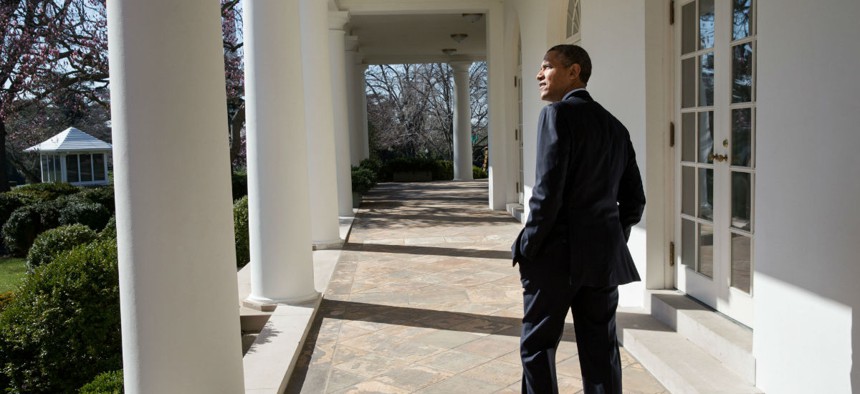
President Obama looks out over the Rose Garden as he walks along the Colonnade of the White House. Official White House Photo by Pete Souza
Note to Managers: Presidential Transition May Trigger Employee Anxiety
A new report stresses the importance of effective communication over the next several months.
Employee engagement, which recent Federal Employee Viewpoint Surveys have shown to be a problem for many agencies, takes on extra importance during the presidential transition now underway, a new report says.
With only half of respondents approving of their leaders’ performance in boosting engagement in the 2015 survey, “effective communication by leaders at all levels will be a critical factor in maintaining workplace satisfaction and commitment and boosting employee engagement during the 2016-2017 presidential transition," according to “Moving the Needle on Employee Engagement During the Presidential Transition,” set for release Wednesday by Deloitte and the nonprofit Partnership for Public Service.
With 4,000 political appointees in the Obama administration set to be replaced over the next six months, uncertainty among the career staff is inevitable, noted the analysis based on a June panel discussion and a review of viewpoint survey results from the partnership’s “Best Places to Work in the Federal Government” study.
Those staying on should strategically tailor their managerial messages to sub-groups such as junior-level employees or soon-to-retire employees, goes the advice from transition veterans. “One interviewee explained that junior-level employees, often going through their first transition, may erroneously believe that incoming leadership can immediately `eliminate their program with a wave of the hand.’ A targeted effort to ensure that junior-level employees are correctly informed could prevent unnecessary anxiety,” the report said.
“Communication about the transition should continue even if there is no news to report, as maintaining momentum is important and regular communication can help employees feel well-informed,” it continued.
As much as possible, leaders should encourage employees to participate directly in their agency’s transition process. “A good time to introduce new political appointees to the workforce is during the post-Inauguration stage of the transition when they are waiting to be confirmed,” the public and private-sector experts recommended. “While the inclination is often to wait for nominees to be confirmed, one panelist argued that ‘worrying about the presumption of confirmation’ wastes valuable time.’ Indeed, the period between the nomination and the confirmation is when the appointee may have free time.”







